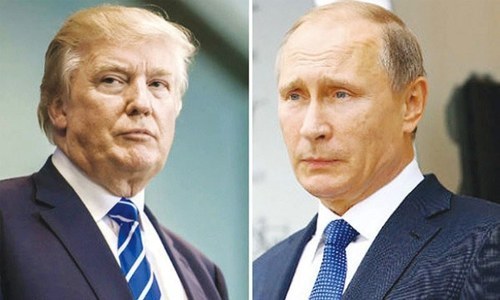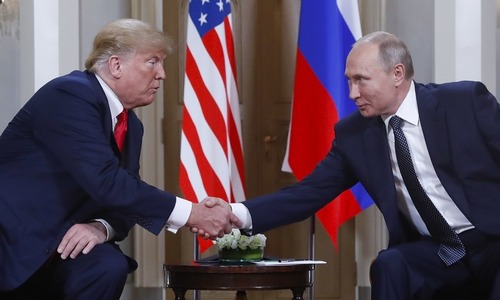JUST one day after his stunning comments in Helsinki, President Donald Trump attempted to backtrack.
In the Finnish capital, standing next to Russian President Vladimir Putin during a news conference, he had cast doubt on the conclusions of US intelligence agencies that Russia interfered in the 2016 election.
Back in the White House on Tuesday, however, Trump argued that he had simply misspoken; he read out a statement saying that he did, in fact, accept that Moscow attempted to sway the vote. At least for a moment.
“Could be other people also,” he added in the very next sentence. “A lot of people out there.”
Not many people in Washington were convinced by Trump’s about-face. Since taking office, Trump has repeatedly called into question his own government’s investigations into Kremlin interference and dismissed the growing body of evidence linking that intrusion to his election win — including a comment from Putin himself on Monday. Since the remarks in Helsinki, moreover, he had been interviewed by Fox News and made no mention of misspeaking. Even his attempted clarification on Tuesday was apparently self-edited into something more defiant.
Nor did Trump say anything on Monday about Russia’s 2014 annexation of Crimea or its role in buttressing the violent excesses of the Syrian regime. That timidity stood in contrast to his sweeping criticism of America’s Nato allies in Brussels last week. To many Trump critics, his performances in both cities capped a year and a half of both tacit and overt attacks on the transatlantic alliance.
Trump’s behaviour was that “of a man who wants the alliance to fail”, wrote New York Times columnist David Brooks. “His embrace of Putin Monday was a victory dance on the Euro-American tomb.”
“The Russian President was effectively given a free pass by a sitting US President to continue his hybrid war against the West,” wrote Guy Verhofstadt, a former Belgian prime minister. He called on European liberals to rally against Trumpism and its proxies, pointing to a former Trump adviser’s efforts to boost far-right populists on the continent. “The battle is now on to defeat Steve Bannon’s sick dream of a right-wing populist revolution in Europe and a retreat to the murderous nationalism of Europe’s past,” he wrote.
It’s worth asking, even now, whom Trump sees as his enemy. His political campaign was couched in nativist rhetoric against “globalism”, a euphemism for a world of multicultural liberals and business and political elites who he claimed did not have America’s interests at heart.
Since taking power, he has focused such attacks on real institutions — the Democratic Party and civil servants he dubs “the deep state” at home, and multilateral blocs such as Nato and the European Union overseas.
More broadly, he has shown consistent apathy for the American-built world order that guaranteed US supremacy for decades.
“In the post-war world, US policy had four attractive features: it had appealing core values; it was loyal to allies who shared those values; it believed in open and competitive markets; and it underpinned those markets with institutionalised rules,” wrote Martin Wolf of Financial Times. “This system was always incomplete and imperfect. But it was a highly original and attractive approach to the business of running the world.”
Wolf suggests Trump is bent on rejecting that system, which is often what we are invoking when we refer now to the “West”: “For those who believe humanity must transcend its petty differences, these principles were a start. Yet today the US president appears hostile to core American values of democracy, freedom and the rule of law; he feels no loyalty to allies; he rejects open markets; and he despises international institutions. He believes that might makes right.”
“Trump may have diminished US leadership in the world,” Russian analyst Maxim Suchkov said to Today’s WorldView in Moscow last week, “but he still wants domination.”
This worldview leads many analysts to suggest that Trump has more in common with autocrats like Putin than with the elected leaders of Europe’s major democracies. For critics of American hegemony, who have long argued that its stated values have little to do with its geopolitical actions, Trump has confirmed their beliefs.
“That reduces the US from being the leader of the free world to being just another grasping great power,” Daniel Fried, a former US diplomat and fellow at the Atlantic Council, said to my Washington Post colleagues David Nakamura and Carol Morello. It “undoes 100 years of America’s grand strategy,” he added, “which worked out well for us. It won the Cold War, because people behind the Iron Curtain were inspired by our ideas and ideals.”
Instead, Trump champions another vision. Trump’s conception of the West is cultural, not political. It’s anchored in blood-and-soil rhetoric and anger against immigration. Just last week, he argued in Brussels that new migrant arrivals are “very bad for Europe” because they are “changing the culture”.
A host of mainstream European politicians would disagree, as would the majority of their populations. A new Pew survey of eight Western European countries, published this month, found that 66 per cent of those polled believe immigrants make their societies stronger.
But Trump sees this openness as a weakness. Here again, he makes himself a kindred spirit with Putin, another outsider standing sceptically at the door of the liberal West.
“Until 2014, Russia used to see itself as the easternmost bus stop of the Western world,” Dmitri Trenin, the director of the Carnegie Moscow Center, said to The Wall Street Journal. “Since then, there has been a fundamental shift and Russia has turned inward. The Russian elite and its leader, Putin, have come to the conclusion that attempting to become part of the West won’t lead to desired results.”
This involves an attempt to turn east and cultivate deeper ties with Asia. But it has also seen the Kremlin build links with the same European far-right populists that Trump has celebrated.
Matteo Salvini, Italy’s interior minister and far-right leader, is pushing for the end of EU sanctions on Russia. Putin, meanwhile, has cultivated a global image as a preeminent Christian nationalist leader and is cheered by white supremacists in the United States.
The governments Putin and Trump lead may be at odds, but the two men themselves, argued journalist Leonid Ragozin, are on “the same side of the divide”. They represent “the same strain of a rising global culture: that of viciously xenophobic tabloids, politically biased infotainment TV, tacky showbiz, irresponsible populism, rabid nativism, and oligarchic kleptocracy,” he wrote for BuzzFeed News.
And their bewildered adversaries, now led by a hobbled Europe, are struggling to cope.
By arrangement with The Washington Post
Published in Dawn, July 19th, 2018
















































Dear visitor, the comments section is undergoing an overhaul and will return soon.